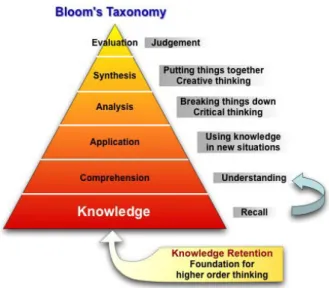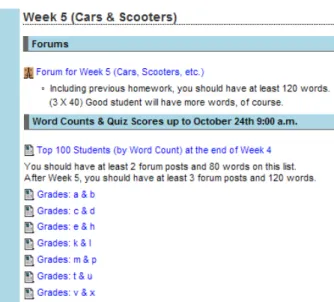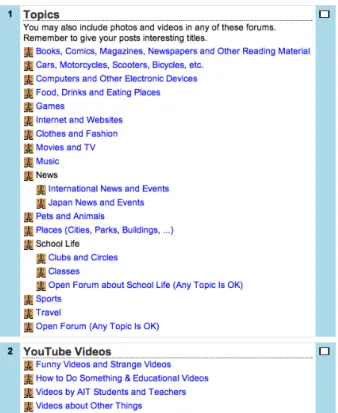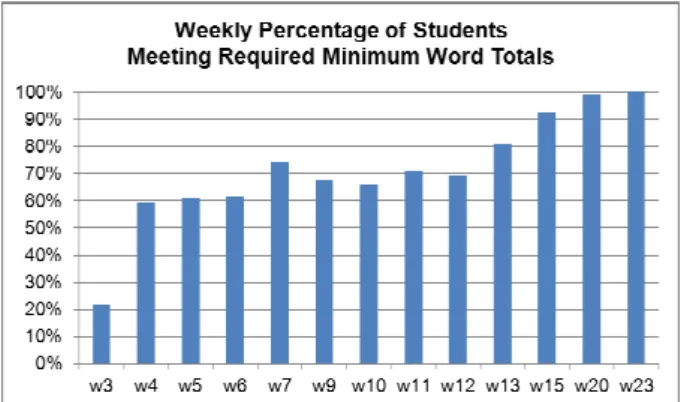†愛知工業大学 基礎教育センター(豊田市)
英会話学習におけるモチベーション向上のためのオンラインフォーラム
Online Forums for Increasing Motivation in English Language Learning
Robert Clayton, Charles Kelly
†ロバート・クレイトン、チャールズ・ケリー
Abstract: This article discusses the effectiveness of Moodle forums in motivating university students to study English as
a foreign language. Educational psychology is discussed and three key components of language learning are used to evaluate the results of a case study. Online forum activity is analyzed for forum assignments completed by 904 students who were taught by 10 native English-speaking teachers during the same semester at Aichi Institute of Technology.
1. Introduction
English Conversation classes at Aichi Institute of Technology (AIT) have incorporated online homework since 2004. Online forums using Moodle began in 2006.
This article examines the effectiveness of using the Internet and Moodle forums to teach English as a foreign language to freshmen students at AIT. A short discussion of educational psychology explains the overall appeal of online technology for English Language Learning. Forums are discussed in detail using the Moodle website for freshman taking English conversation as a required course at AIT.
Results from a quantitative analysis of forum-related online activity for a large group of students is then illustrated and discussed in terms of motivating students who are studying English at the university
2. Background
The popularity of social media continues to grow as advances in technology make telecommunication easier, faster and less expensive. People around the world enjoy the ease and convenience of the Internet and other social media to inform and discuss a wide range of individual, family, work and socially oriented activities. In fact, the Internet and social media have proven powerful enough to unify people to reshape their society to the disbelief of their leaders and the world. We are indeed left with the impression that Microsoft founder Bill Gate’s often quoted statement “the Internet has
changed everything,”1 is still as pertinent today as it was
in the 1990s.
Use of the Internet for English education has a long and proud history at Aichi Institute of Technology (AIT). In 1995, AIT began hosting “The Internet TESL Journal”2 website where Charles Kelly and Lawrence
Kelly worked as volunteer editors to provide free web-based classroom and self-study materials with no advertising. Harvested from years of hard work, the website contains a wealth of information and remains popular with teachers and students around the world.
In keeping with the dynamic nature of the Internet, English education at AIT has remained ambitious over the years striving to harness the power of the Internet for education. As early as 2004, English conversation students began submitting weekly assignments using web-based email forms. Charles Kelly also began experimenting with an emerging free open-source software package known as Moodle. As the acronym implies, Moodle (Modular Object-Oriented Dynamic Learning Environment) offered a unique and flexible approach to teaching English online without the high costs normally associated with such a venture.
In 2006, Charles Kelly adopted the new technology and set up a computer server system in his office at AIT. English conversation teachers began using Moodle for Internet-based activities to encourage students to continue to improve their English skills outside of the classroom. “In 2008, Aichi Institute of Technology
installed Moodle on the school server and established it as the campus-wide course management system.”3
Figure 1. Moodle’s Popularity
Since finding a home at AIT in 2004, Moodle’s popularity around the world as an internet-based education system has accompanied the increasing popularity of social media. Well documented in previous issues of AIT’s Kiyo and other publications, Moodle’s use and success at AIT for English language education continues in this issue. In this article, we will examine the use of Moodle to motivate students to apply their English skills and communicate with other people on the Internet.
3. Theory and Technology
Bloom's Taxonomy4, by Benjamin Bloom, is often
used by educational psychologists to explain learning as consisting of the six levels displayed in the accompanying image.
Figure 2. Bloom’s Taxonomy
After graduating from junior and senior high school in Japan, AIT students are expected to have a basic level of knowledge and comprehension skills in English. As with any classroom however, these levels vary widely from student to student. For this reason, knowledge and comprehension level skills are reviewed in the classroom as well as outside the classroom using online Moodle quizzes. With limited in-class time for free conversation style activities, students are encouraged to
apply their English skills through Moodle forum
assignments. Moodle forums provide an ideal educational tool to encourage students to progress to the
Application level of learning.
Moodle’s forums are also appealing to language educators as an opportunity for students to learn to express and exchange ideas and opinions with friends and peers. The value of this type of learning environment is well documented in both Albert Bandura’s Theory of Social Learning as well as Lev Vygotsky’s Socio-cultural Theory.
Vygotsksy’s theory of “Zone of Proximal Development” also helps explain the educational appeal of Moodle’s forums. Teachers can better help students individually as students complete online assignments based on their own unique set of skills.
Figure 3. Zone of Proximal Development
Although Moodle clearly supports the theories of the fore above mentioned educational psychologists, the question remains as to whether or not Moodle succeeds in meeting the three key components of (1) exposure, (2) opportunity and (3) motivation as outlined by linguist and educational researcher Stephen Krashen and his theories concerning language acquisition and learning.5
use Moodle as part of the English education curriculum. The website content is in English and designed to
expose students to as much English as possible.
Deadline-driven quizzes and assignments ensure this
exposure occurs on a weekly basis. Moodle forum
assignments provide an opportunity for students to use their English skills, regardless of level, at a time and place of their choosing.
This article will review data and discuss the use of Moodle forums to motivate students who are learning English as a foreign language.
4. Students and Moodle Forums
AIT freshman students are introduced to online forums in a step-by-step process during their 15-week second semester course.
By the end of Week 2, students are expected to have completed course registration and should be settled into their classes. Having already used Moodle during the first semester, AIT students are familiar with accessing and navigating the Moodle website to do online assignments and to read other textbook-related material.
Forum assignments begin in Week 3 when students are asked to answer one question by posting a reply of at least 40 words. Because the objective is to teach students how to post comments in forums, instructions are initially provided in both English and Japanese.
Figure 4. First Forum Assignment: Week 3
In Week 4, students are given a list of questions from which they must select one and answer. Students are encouraged to write as much as possible but are required to reply with at least 40 words. This style of forum continues until Week 10 as students are given lists of questions or topics to post a forum reply. To encourage students to express their own thoughts,
are able to view those of the other students.
Figure 5. Second Forum Assignment: Week 4
Figure 6. Example of Question and Answer Forum From Week 11, and continuing through the end of the course, forum limitations are removed as student begin free discussion. They are also taught and encouraged to upload pictures and embed videos into their forum entries. Students have the option to either introduce a forum topic of their own to write about or they can reply to another student’s topic and comment.
Figure 7. Example of Forum Entry After Week 11 During the English conversation course, students
apply their knowledge and comprehension of English as
a foreign language while exchanging ideas and opinions with all AIT students taking the same course that year.
5. Forum Guidelines and Student Motivation
Students are encouraged to participate in many forums and to write as much as possible. As students learn about Moodle forums, posting procedures are explained in detail and initial forum topics are reviewed by teachers in hopes of making topics interesting and enjoyable for the students. By the end of the course, forum content is determined by the students as forums are opened to free discussion. Teachers hope to create an intrinsically motivating environment through Moodle forums as a social media.
Teachers monitor student online performance by viewing activity logs and noting word count statistics. Students are warned against plagiarism and the use of computer translation; offending student entries are deleted without notice. A “Top 100 Students” feature is introduced in Week 5 to promote friendly competition among students as measured by forum word counts.
Extrinsic motivational techniques are also used in an effort to have student apply their English knowledge and
comprehension skills. Students are instructed from the
beginning of the course that higher word totals in their forums will help improve grades and that a minimum of 40 words per forum entry is required to pass the course. In Week 5, students are reminded of the pass/fail status of forum homework and weekly forum word count statistics are made available to students online.
Figure 8. Example of Top 100 and Grades Posted Color-coding is used to highlight weekly word counts to help students more easily understand their status.
Figure 9. Explanation of the Color-coding for Students No forum homework is assigned during Week 8 and students are given the last forum assignment in Week 13 just before their winter vacation. Notices are posted on the Moodle site warning students that they will not pass the course if they do not have a minimum of 10 forum postings and 400 words.
Students are encouraged to continue using the forums voluntarily as an English-based social media during winter vacation and until the course ends.
Figure 10. The Optional “English Forums” Course. After completing the English conversation course, AIT students may register for a no-credit “English Forums” Moodle course where they continue communicating with other AIT students until graduating from the university. By mid-March 2012, over 350 students from the 2011-2012 second semester classes had registered.
6. Data Analysis
In order to analyze the effectiveness of Moodle forums in motivating students, entry postings and word counts were collected weekly using Paul Daniels’ Text Analysis Moodle module6 to create a dataset for
analysis. Students must have met the following criteria: (1) First year students. As a first-year required
course, students who fail English conversation must retake the course to meet graduation requirements. Since the Text Analysis module collects data site-wide, the results include data from previous years. Students repeating the course were removed from the data.
(2) Completed minimum requirements: Students were required to post a minimum 10 forum entries of 40 or more words. Students with less than 10 entries or less than 400 words by the end of the course were not included.
14 majors who were in 40 classes taught by 10 native English-speaking teachers. All students were taught under the same curriculum while using the same textbook and accessing the same Moodle forum site.
In keeping with the curriculum, 10 forum homework assignments were completed between Week 3 (w3) and Week 13 (w13). No forum homework was given during Week 8 in order to allow students to complete assignments for Week 3 through Week 7. After Week 8, previously assigned forums were hidden from student view. Forum activity during the following weeks was also included:
- Week 15 (w15) to represent activity during the winter vacation.
- Week 20 (w20) to represent activity after the end of the course.
- Week 23 (w23) to represent activity after the semester had ended.
Data analysis results were then analyzed with results graphically illustrated.
Figure 11. Weekly Total of Additional Words
To calculate weekly changes for the entire group of 904 students, total word counts were collected and totaled each week. Previous week totals were then subtracted to create the weekly statistics shown. The minimum weekly total should have been 36,160 for 904 students with a minimum of 40 words each.
Figure 12. Weekly Percentage of Students Adding 40 or More Words
Students with less than a total of 400 words in their forums did not meet the minimum course requirements and were therefore not included in the dataset. The percentage of students who actually completed their forum homework each week was examined and graphed.
Figure 13. Weekly Average of Additional Words Per Student
Weekly forum word totals were then analyzed to determine the average length of forum postings weekly for those students meeting the intial 400 total word requirement. Weekly changes in total word counts were divided by 904 (the total number of students) to determine the illustrated results.
Figure 14. Weekly Percentage of Students Meeting the Required Minimum Word Totals
Word totals should have increased by at least 40 words each week between Week 3 to Week 13 with the exception of Week 8 when no forum homework was assigned. Student access to forums for Week 3 thorugh Week 7 was ended from Week 9. Students then had access to all forums starting in Week 9 and lasting until
the forums were closed in Week 23. The illustration shows the weekly percentage of students who had completed the minimum total of 400 words by Week 23.
Figure 15. Forum Grade Distribution
Grades for students at Aichi Institute of Technology are assigned as S for 90% or greater completion, A for 80%, B for 70%, C for 60% and F for less than 60%. The minimum word total requirement of 400 words was set as a baseline for C grades and the following total word count grading scale was used in the illustration: S for 667+, A for 534+, B for 467+, C for 400+ and F for less then 400.
To encourage students to continue applying their
knowledge and comprehension of English as a foreign
language during winter vacation, Moodle forums remained available to students even after the last homework assignment was given in Week 13.
Although all students in the dataset met the requirement of 400 total words by the end of the course, actual student performance was examined hyperthetically by assigning “forum grades.” “Forum grades” were then calculated using Week 13 (w13) data when the last forum homework assignment should have been completed and Week 23 (w23) when the Moodle forums were shut down. Course final grades differed from the illustrated hypothetical “forum grades.”
7. Conclusion
The objective of this article was to examine the effectiveness of Moodle forums in motivating students at AIT who are studying English as a foreign language.
A brief review of Moodle and Internet use at AIT was followed by a discussion why teachers find Moodle forums appealing in terms of educational psychology. The three key components of (1) exposure, (2) opportunity and (3) motivation, as outlined by linguist and educational researcher Stephen Krashen for
for evaluation.
Moodle forum use by AIT teachers and students was discussed along with notable features designed to motivate students as they apply their English knowledge and comprehension skills to communicate online with other university students taking the same course.
Quantitative analysis of preconditioned data from 904 students was examined with the following conclusions drawn regarding Kranshen’s three key components. The Moodle website at AIT and English conversation forums are designed to maximize English exposure during the curriculum. Online availability ensures students have an opportunity to use their English skills at a time and place of their choosing. A quantitative analysis of student online activity reveals that students are in fact motivated to use English. Whether this motivation is intrinsic or extrinsic in nature is left to interpretation of the data and the beyond scope of this study.
1. Gates, B (1999). Business @ the Speed of Thought
2. Kelly, C & Kelly, L. (1998). The Development and Maintenance of The Internet TESL Journal,
http://iteslj.org/Articles/Kelly-ITESLJ.html 3. Kelly, C & Kelly, L. (2009. Using Moodle
for English Conversation Classes at AIT http://aitech.ac.jp/lib/electricdoc/files/44/A0 5.pdf
4. Bloom, B. S., Engelhart, M. D., Furst, E. J., Hill, W. H., & Krathwohl, D. R. (1956). Taxonomy of educational objectives: the classification of educational goals;
Handbook I: Cognitive Domain New York, Longmans, Green, 1956.
5. Krashen, S. (1981). Second language
acquisition and second language learning.
Oxford: Pergamon.
6. http://moodlemodules.netcourse.org/2007/0 8/07/text-analysis-module/




